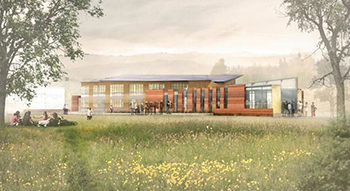 BASALT, Colo. — The Rocky Mountain Institute (RMI) broke ground Oct. 15 on its new Innovation Center based in Basalt.
BASALT, Colo. — The Rocky Mountain Institute (RMI) broke ground Oct. 15 on its new Innovation Center based in Basalt.
RMI is a nonprofit research and educational foundation that collaborates with businesses, communities and institutions to provide solutions for switching to efficient and renewable energy. Together with ZGF Architects in Portland, Ore., and Kansas City, Mo.-based JE Dunn Construction, RMI aims to make its Innovation Center an example of integrative design and energy and resource efficiency.
“RMI has huge ambitions — nothing short of changing the way the world produces and consumes energy," said RMI Managing Director and General Counsel Marty Pickett in a statement. “RMI’s Innovation Center in Basalt, Colorado, not far from where RMI was founded 32 years ago, will provide offices for 50 staff and offer a convening venue for collaboration with the community, industry stakeholders and global leaders.”
With 15,610 square feet and a predicted energy-use intensity of only 16 kBTU per square foot, it’s expected that the center will be the most efficient building in the coldest climate zone in the U.S. The building will include an approximately 80 kilowatt, roof-mounted solar photovoltaic system, and it will be net zero energy facility, producing equal-to or more energy than it uses on an annual basis.
The building will also redefine how occupants experience and control their individual comfort in buildings. This will be accomplished through passive design measures and a variety of technologies that eliminate the need for mechanical cooling and reduce heating to a limited, distributed system.
RMI, along with its building partners, will use an integrated project delivery process. This process aligns financial incentives around an integrative design process. A multi-party agreement ensures that both cost and performance goals will be met.
RMI also plans to have one of the first graywater reuse systems in the state, once Colorado legislation is finalized to allow it. Graywater is wastewater from laundry, baths, sinks and showers. Last year, Colorado Gov. John Hickenlooper signed the final draft of House Bill 1044, allowing the use of graywater in homes and businesses. The use of graywater at RMI’s Innovation Center will ensure the building does not use any potable water for toilet flushing or landscape irrigation.
RMI plans to publish updates about the project’s successes and challenges throughout its design and completion. About 90 percent of buildings in the U.S. are less than 25,000 square feet in size, similar to RMI’s new building. The institute said in a statement that the results of the new building’s design, contracting, construction and operations process, as well as its performance, can be replicated by other designers, owners, occupants and investors.
“From reinventing the design process to creating a new definition of occupant comfort, the building team has continually explored the edge of what is possible,” said Kathy Berg, partner at ZGF Architects LLP, in a statement. “ If every commercial building in the U.S. increased its energy efficiency to this level, enough energy could be saved in one month to power New York City for an entire year.”
“The partnership among JE Dunn, RMI, and ZGF Architects is a perfect blend of expertise in energy, construction, technology and design," added Mike Tilbury, project executive for JE Dunn Construction, in a statement. "JE Dunn has built numerous projects throughout the U.S. that have the highest energy efficient standards. This project takes that excellence to the next level and will showcase JE Dunn’s use of the latest technologies in energy efficient construction.”
Construction of RMI’s Innovation Center is estimated to take about a year and will cost $7.5 million for the core and shell plus tenant finishes. This is comparable to other recently built, small, class A office spaces in the Colorado mountain region. Having raised significant funds for the building in a quiet phase, RMI will launch a public capital campaign to complete funding.
“RMI has a rich history of collaboration and innovation in the Roaring Fork Valley,” said Jacque Whitsitt, Basalt’s mayor, in a statement. “The town of Basalt has been an enthusiastic partner in this development project since day one. RMI’s innovation center will anchor the long-term plan to enhance the town economically and culturally.”

